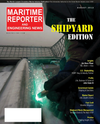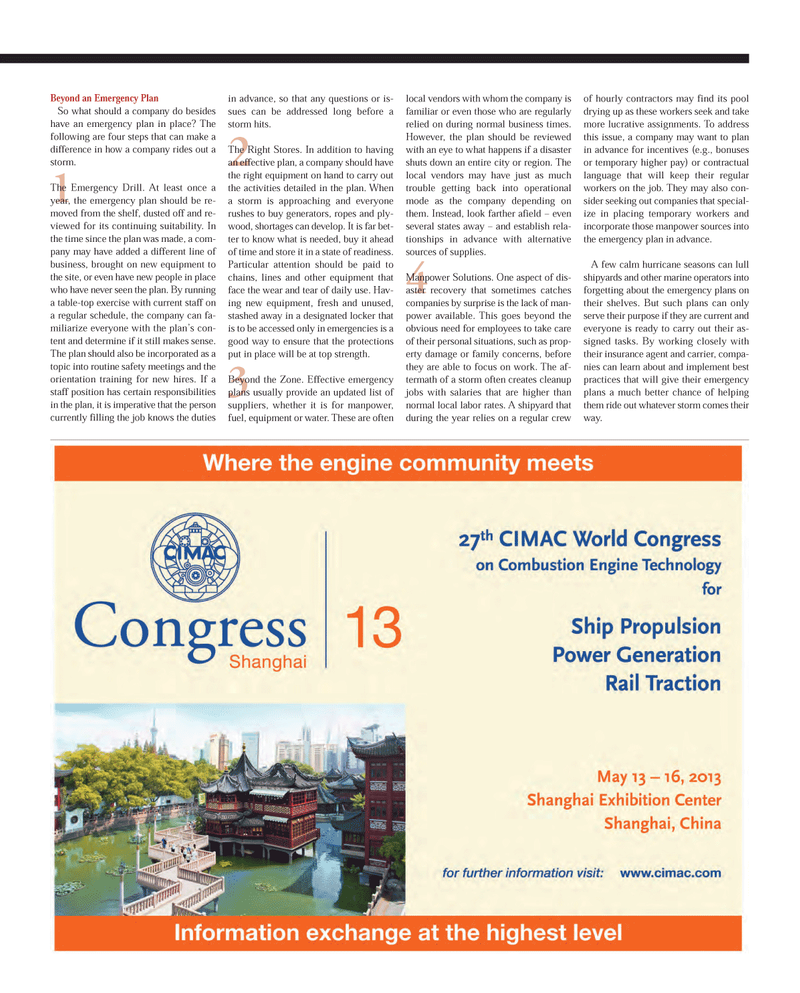
Page 33: of Maritime Reporter Magazine (August 2012)
The Shipyard Edition
Read this page in Pdf, Flash or Html5 edition of August 2012 Maritime Reporter Magazine
4321Beyond an Emergency Plan So what should a company do besides have an emergency plan in place? The following are four steps that can make a difference in how a company rides out a storm.The Emergency Drill. At least once a year, the emergency plan should be re- moved from the shelf, dusted off and re- viewed for its continuing suitability. In the time since the plan was made, a com- pany may have added a different line of business, brought on new equipment to the site, or even have new people in place who have never seen the plan. By running a table-top exercise with current staff on a regular schedule, the company can fa- miliarize everyone with the plan?s con- tent and determine if it still makes sense. The plan should also be incorporated as atopic into routine safety meetings and theorientation training for new hires. If a staff position has certain responsibilities in the plan, it is imperative that the person currently filling the job knows the duties in advance, so that any questions or is- sues can be addressed long before astorm hits.The Right Stores. In addition to having an effective plan, a company should have the right equipment on hand to carry outthe activities detailed in the plan. When a storm is approaching and everyone rushes to buy generators, ropes and ply- wood, shortages can develop. It is far bet- ter to know what is needed, buy it ahead of time and store it in a state of readiness.Particular attention should be paid to chains, lines and other equipment thatface the wear and tear of daily use. Hav- ing new equipment, fresh and unused, stashed away in a designated locker that is to be accessed only in emergencies is a good way to ensure that the protections put in place will be at top strength.Beyond the Zone. Effective emergency plans usually provide an updated list of suppliers, whether it is for manpower, fuel, equipment or water. These are often local vendors with whom the company is familiar or even those who are regularly relied on during normal business times. However, the plan should be reviewed with an eye to what happens if a disaster shuts down an entire city or region. The local vendors may have just as much trouble getting back into operationalmode as the company depending on them. Instead, look farther afield ? even several states away ? and establish rela- tionships in advance with alternative sources of supplies.Manpower Solutions. One aspect of dis- aster recovery that sometimes catches companies by surprise is the lack of man-power available. This goes beyond the obvious need for employees to take care of their personal situations, such as prop-erty damage or family concerns, before they are able to focus on work. The af- termath of a storm often creates cleanupjobs with salaries that are higher thannormal local labor rates. A shipyard that during the year relies on a regular crew of hourly contractors may find its pool drying up as these workers seek and take more lucrative assignments. To address this issue, a company may want to plan in advance for incentives (e.g., bonuses or temporary higher pay) or contractuallanguage that will keep their regular workers on the job. They may also con- sider seeking out companies that special-ize in placing temporary workers and incorporate those manpower sources into the emergency plan in advance. A few calm hurricane seasons can lull shipyards and other marine operators into forgetting about the emergency plans on their shelves. But such plans can only serve their purpose if they are current and everyone is ready to carry out their as- signed tasks. By working closely with their insurance agent and carrier, compa- nies can learn about and implement bestpractices that will give their emergency plans a much better chance of helpingthem ride out whatever storm comes their way. MR#8 (26-33):MR Template 8/8/2012 11:59 AM Page 33

 32
32

 34
34
